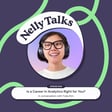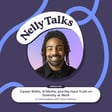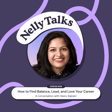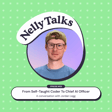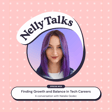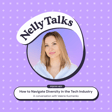
#03 | Networking for Success in Male-Dominated Fields - Kiana Kamalian
In this episode of Nelly Talks, join Nelya as she sits down with Kiana Kamalian, a creative director who shares her inspiring journey from engineering to the creative industry. Whether you’re looking to reinvent your career, build your personal brand, or navigate the complexities of freelancing and entrepreneurship, Kiana’s insights provide actionable lessons that you won’t want to miss.
Timestamps:
00:00 Nelly Talks Intro
00:54 Meet Kiana Kamalian
01:33 Where are you working from today?
02:42 Did you always know you wanted to get into this role?
06:34 What joys and challenges come with your current role?
09:51 Do you achieve a good work-life balance working for yourself?
13:09 How has AI impacted your role so far?
18:27 Did you find representation and diversity in your industries?
21:57 What can companies do better to support diversity in these industries?
26:54 How do you build and use your network for success in the creative sector?
29:49 What advice would you give your younger self?
33:14 Nelly Talks Outro
Key Points:
Kiana transitioned from engineering to a creative career after realising she wasn’t fulfilled despite being successful. A personal turning point (breaking her wrist) led her to explore freelancing and creative roles.
One of Kiana’s challenges in her new career was understanding and articulating her value as a creative professional, especially when entering an industry without a traditional background.
Kiana uses AI tools like ChatGPT to handle administrative tasks, research, and even creative enhancements. These tools help her work more efficiently and focus on higher-value creative work.
Networking was critical for Kiana’s successful transition to a creative career. She regularly attended co-working spaces, networked with other entrepreneurs, and asked for mentorship. In her engineering career,
Kiana noted the lack of diversity and how that impacted her experience. She suggested companies partner with organisations like the Women’s Engineering Society (WES) to bring diverse perspectives and training.
Let us know what guests you'd like us to interview in future episodes!
